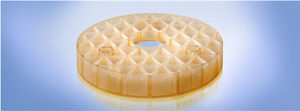
Ceramic ZERODUR® K20
Add to favorites
Compare this product
Description
Product Information
Small thermal expansion for high-temperature applications
ZERODUR® K20 has been optimized to withstand higher application temperatures than ZERODUR®. The material is white in color and offers good infrared (IR) transmittance between 3.5 and 5 μm and homogeneous high reflectivity properties.
The non-porous ZERODUR® K20 exhibits good polishing abilities, excellent vacuum properties and can be delivered as small, high-precision optical components.
Advantages
• Optical high long-term temperature stability up to 850 °C at compared to glases with low CTE of 2 x 10-6
• Can be matched with low thermal expansion metal alloys (e.g. Invar®)
• Excellent homogeneity and internal quality
• A remission of more than 90% in the visible range with a matte brilliant white finish
• Free of pores and polishable to low surface roughness levels
• Large-scale parts can be produced with dimensions up to 1.5 m
Technical Details
Properties
ZERODUR® K20
Expansion coefficient α (20 - 700 °C) [10-6/K] : 2.4
Expansion coefficient α (20 - 300 °C) [10-6/K] : 2.2
Expansion coefficient α (0 - 50 °C) [10-6/K] : 1.6
Density p [g/cm3] : 2.53
Young’s modulus E [GPa] : 84.7
Heat Capacity cp at 20 °C [J/(gK : 0.90 (extrapolated)
Thermal conductivity at 20 °C [W/(mK : 1.63
Max. application temperature [°C] : 850 Quality Assurance
State-of-the-art measurement equipment is used to inspect ZERODUR® K20 glass ceramic parts during the entire manufacturing process.
Catalogs
No catalogs are available for this product.
See all of SCHOTT GLAS‘s catalogs*Prices are pre-tax. They exclude delivery charges and customs duties and do not include additional charges for installation or activation options. Prices are indicative only and may vary by country, with changes to the cost of raw materials and exchange rates.


